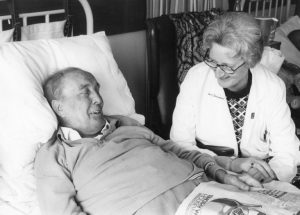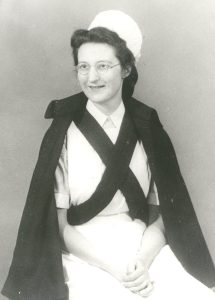28 Oct Who was Cicely Saunders?
Pioneering hospice founder Dame Cicely Saunders remembered
~by Bill Gibb for The Sunday Post (UK); published 4/30/2018
SHE lived a life that was full, sometimes colorful and ultimately ground-breaking.
And she ended it in a way she felt so many should, with dignity, care and compassion in a hospice she founded.
Now the remarkable story of the pioneer of the hospice movement, Dame Cicely Saunders, is being told in a new book to mark the centenary of her birth. Its author, Professor David Clark, says the part played by a caring Scot was crucial in steering her to develop the principles that have changed end-of-life care. David will be previewing Cicely Saunders: A Life And Legacy, next Sunday at the Boswell Book Festival.
“I first met her in 1995 and got to know her very well in the 10 years before her death in 2005,” said David, Professor of Medical Sociology at the University of Glasgow’s Dumfries campus. I don’t think I’m alone in that I found her quite intimidating. She was very tall and earnest and didn’t do small talk much.”
David worked on two books with Dame Cicely, on her letters and her writings, and planned a third, a biography to be published after her death.
Born in Hertfordshire in June, 1918, she became a nurse, dealing with death firsthand in the Second World War. After a back injury forced her to give that up, she became a medical social worker and then was persuaded to train as a doctor.
David said: “She spent time with a Polish man, dying of cancer, in the last few weeks of his life. She realized the noisy, hurly burly of a new NHS hospital in the late 1940s wasn’t the best place for him to come to the end of his life. She started to look into the subject and realized there really wasn’t much in the way of books and research. She volunteered in a home for those who were dying and after completing her medical training, devoted her entire professional career to improving the care of the dying. She was the first modern doctor ever to do that.”
Although there had been hospices before, they were on a different scale and with a more limited purpose. The very earliest, in London and founded by Frances Davidson, was a source of fascination and inspiration for Dame Cicely.
“She was from Aberdeenshire and in the 1880s she set up this hospice, mainly looking after people with tuberculosis,” David said. “Cicely was really interested in these places which she visited and got to know the people who ran them. But she wanted to take it much further and St Christopher’s, which she opened in 1967, built on what early hospices had done. The two aspects she added were teaching and research and that’s why St Christopher’s is thought of as the first modern hospice. She also realized that it wasn’t just about the patient, it was about the family and friends, too. And also, crucially, about care in the community.”
While her professional focus was absolute, bringing worldwide attention and more than 25 honorary degrees, her private life was also striking.
“She fell in love with three men, all Polish, and two of whom were dying,” explained David. “The first was the man whose death really started her looking into end-of-life care and the second was in the 1960s. The third was an artist. They married when she was 61 and he was almost 80. They had a happy marriage until he died in St Christopher’s, where she passed away herself in 2005.”
World ‘unprepared for tsunami of ageing and dying’
More than a million people die every week and a combination of rising birth rates and people living longer will see that figure almost double in the next 40 years. “It’s an astonishing figure,” said Professor David Clark, who founded the University of Glasgow End of Life Studies Group in 2014. “The world is facing a tsunami of ageing and dying for which it’s completely unprepared. We are trying to raise awareness of this and come up with strategies. Palliative care in Scotland is up there with the best in the world in terms of the amount of provision and specialist services that we have, but it’s a massive issue. We have done two studies showing that, on any given day, a third of inpatients in our 25 biggest hospitals are in the last year of their lives. We need to think about how good we are at identifying these people and what conversations we should be having with them and their families about their end of life wishes.”



